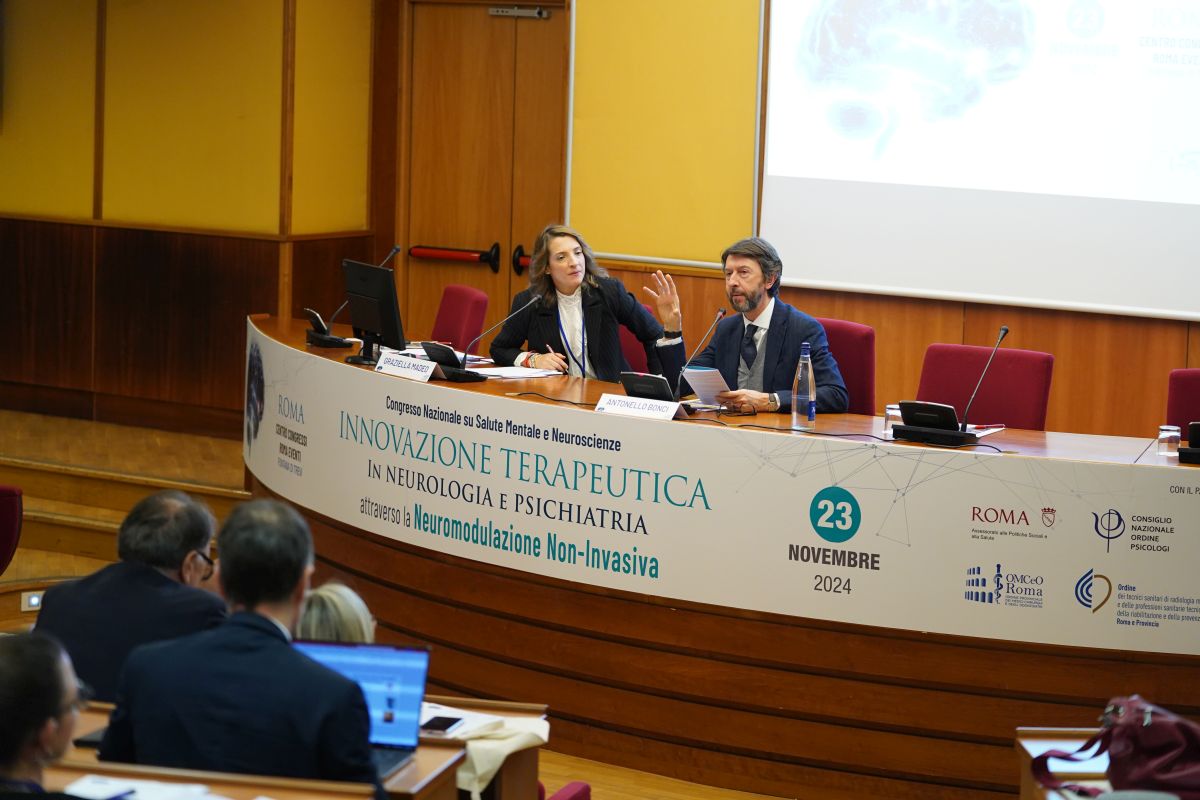ROME (ITALPRESS) – “We are on our way to a society that is more aware of the dangers, attentive to prevention and more focused on treatment: a society that wants to be well, where mental health and the well-being of our brains cannot be ignored. Fundamental progress has been made in this field that gives us confidence for the future. We are all working for a new and multidisciplinary science, committed to a collaboration where everyone is involved, open also to international collaborations because there are no frontiers for health explorers, but there are only goals.” The National Congress on Mental Health and Neuroscience, entitled “Therapeutic Innovation in Neurology and Psychiatry through Non-Invasive Neuromodulation,” opened with these words in a video message from Anna Maria Bernini, Minister of University and Research. An event of great importance for the world of neurology, psychiatry and psychology, which was attended by leading scientists and clinicians, internationally recognized for their contribution to research and clinical practice. “This paradigm shift increasingly sees public and private working at the same table with a single goal, that of scientific research, without which it is not possible to do prevention and take charge of the different pathologies,” as stated by Elisabetta Simeoni, Director of the Department for Anti-Drug Policies of the Presidency of the Council.Today, diseases such as Alzheimer’s, Parkinson’s, depression, schizophrenia and anxiety disorders affect millions of people worldwide, with a devastating impact not only on patients’ quality of life, but also on the health care system and society as a whole. According to data from the World Health Organization (WHO), diseases of the nervous system are responsible for 10 percent of the global burden of disease; a figure that is expected to grow as the population ages, particularly in industrialized countries. In Italy, neurological diseases are the leading cause of disability and the second leading cause of mortality. It is estimated that more than 1.4 million people have dementia, including about 600,000 with Alzheimer’s disease. Regarding Parkinson’s disease, an estimated 250,000 to 400,000 individuals and the discrepancy is attributable to possible undiagnosed cases, especially among the elderly, and the number of patients is expected to double by 2050, reaching more than 600,000 cases. There are also worrying trends in psychology and psychiatry: According to the Italian Society of Psychiatry, major depression affects 7.5 million Italians, or 12.5 percent of the population, while anxiety disorders and panic attacks affect 5 percent of the population. Approximately 3 million people, mainly adolescents and young adults, live with eating disorders.Therapeutic innovation in neurology and psychiatry is crucial to address the growing challenges posed by neurological and psychiatric disorders. Noninvasive brain stimulation techniques, such as transcranial magnetic stimulation (TMS), are one of the most promising frontiers of neurological and psychiatric research. During the congress, numerous clinical studies highlighted the effectiveness of these techniques in treating a wide range of disorders, from depression and anxiety to neurodevelopmental disorders in children and adolescents or in treating visual field deficits.”We need to create a concrete plan as a clinical-scientific community to disseminate TMS as an integral part of treatments at the public level, as is already happening in Valle d’Aosta, Veneto and Sicily,” explained Antonello Bonci, Founder GIA Miami, USA and Scientific Director Brain&Care Group, Rimini, Miami, President of the Brain&Care Research Foundation. The use of neuromodulation techniques makes it possible, in fact, to implement strategies for the personalization of therapeutic interventions so as to maximize their benefits: a process put in place for the treatment of chronic diseases, Alzheimer’s and Parkinson’s, but also for the treatment of addictions or fatigue, the deterioration from fatigue overload that becomes pathological when it does not disappear with rest.Ample space was also devoted to a discussion of the opportunities given by digital technologies for health, “digital therapeutics,” the new software with beneficial effects for monitoring and therapeutic interventions, developed for businesses and health facilities, for the doctor and the patient. Italy, lagging behind in digitization, is in urgent need of education and research in digital health and digital therapeutics, health software designed to alleviate disease with demonstrable positive impact on patient health. The congress highlighted how diseases of the nervous system are constantly evolving, emphasizing the importance of introducing innovative tools whose effectiveness is proven by scientific research. It also emerged the need to create a common voice capable of promoting the benefits of noninvasive neuromodulation, which prove particularly significant when integrated into the daily routine of prevention and treatment. “Neurologists, psychiatrists, psychologists and other mental health professionals must work together, not in a fragmented manner, but as one team for the well-being and improvement of people’s quality of life,” the call from Graziella Madeo, director of the Neuromodulation and Clinical Research Unit of Brain&Care Group, Rimini.
– Press office photo Brain&Care Research Foundation –
(ITALPRESS).

